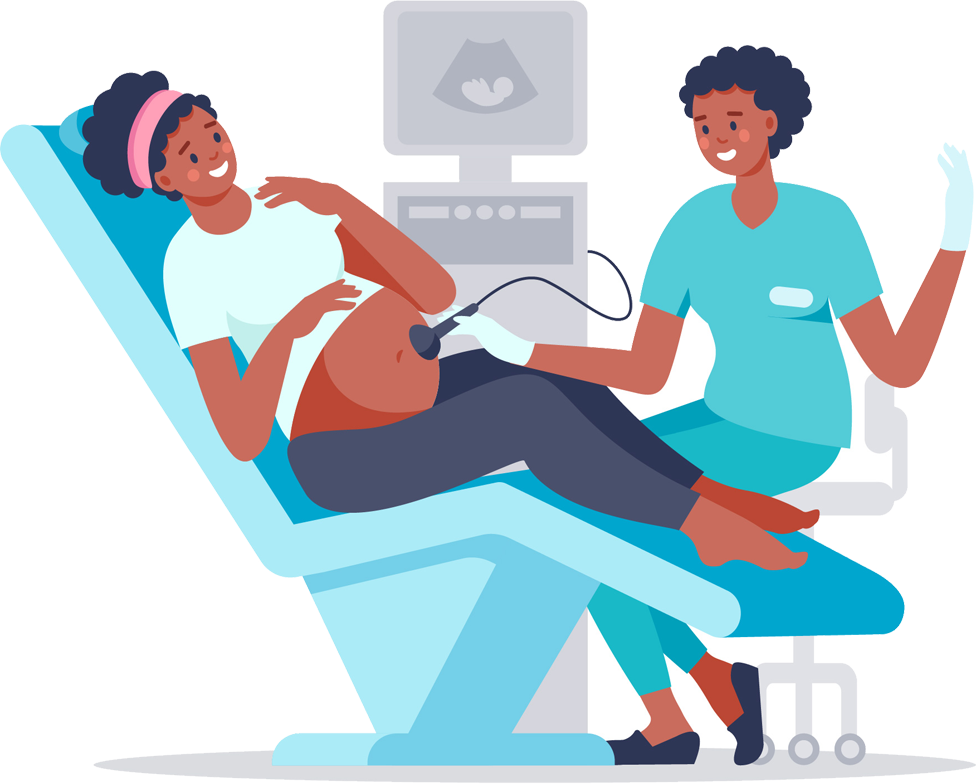
5 Steps to Take for a Heart-Healthy Pregnancy—and Beyond
A collaborative, patient-centered care team can make all the difference. For more information, visit abcardio.org.



This discussion and the information obtained during this visit can help you and your clinician get to know each other better AND help you make the best, most informed decisions for you, your baby and your family.

Talk to Your Clinician About Getting Pregnant
The Preconception Visit
A preconception checkup happens prior to your pregnancy to help make sure you're healthy before you conceive.
At these visits, you should:
- Discuss your personal pregnancy history.
- Discuss your personal and family history or major health risks—including hypertension and diabetes of pregnancy, preeclampsia, premature labor, small babies and cardiovascular disease—including stroke, blood clots and heart attacks.
- Discuss your risk factors for heart disease and how you can modify them now.
- Discuss how you can reduce your risk of poor outcomes, including:
- Chronic conditions such as obesity, hypertension and diabetes.
- Consult with a maternal-fetal medicine/high-risk obstetrician, a cardiologist and/or a nutritionist.
- Determine if a midwife and/or doula (a professional trained to provide emotional support and advocacy) would be beneficial.
- Ask about prenatal supplements and/or lifestyle changes that can help optimize your pregnancy.


First Trimester
How to Prepare for Your Visits
- Seek out a clinician that has a history or patient-centered care.
- Be prepared to have in-depth discussions about your medical history with an emphasis on heart and brain health.
- Understand your reproductive health and any pregnancy related complications.
- Understand your risk for preeclampsia, diabetes, hypertension or other conditions that may impact you immediately or in the future.
- Inquire how you can modify these risks—including the use of aspirin, exercise, healthy eating patterns, Vitamin D or iron supplementation or other interventions.




FYI: Data shows 140 minutes of moderate cardio (i.e. briskly walking) daily can decrease risk of preeclampsia.

Second & Third Trimesters
Communicating with Your Clinician
Pregnancy can be nature's stress test on the heart. It is important to know the signs and symptoms for heart conditions, such as preeclampsia. Asking these questions may be helpful.
- Would I benefit from the use of low-dose aspirin to reduce my risk of hypertension/ preeclampsia?
- Would I benefit from changing my diet to incorporate more iron and vegetables and fewer carbohydrates?
- Should I measure my blood pressure at home?
- Are my prescription medications and/or supplements safe for pregnancy?
- Would I benefit from the use of vitamin D supplementation?
- What should my weight goals be during my pregnancy?
- Is it safe to exercise? What type of exercise should I do and for how long?
- Are there reasons that my labor may be induced?
- How common are vaginal deliveries vs. C-section for first time mothers in this practice?


Fourth Trimester
The Postpartum Visit
The fourth trimester is the 12-week period immediately after you have had your baby. It is a time of great physical and emotional change as you adjust to your new life. This is an important time for you to continue to see your healthcare professionals.
Important questions to ask include:
- Should I continue to see the cardiologist? And when should I follow up with my OB?
- How or by when should I start considering losing the weight I gained in pregnancy?
- How can I best space my pregnancies and/or how should I plan for the next pregnancy?
- What health goals should I set for the next year?

FYI: If you have any blood pressure concerns, you should ideally see a clinician within the first week of discharge.


Ask you clinician about breastfeeding.
Data suggests breastfeeding lowers the risk of developing diabetes, high cholesterol, high blood pressure and heart disease. Discuss these benefits with your healthcare professional.

Important conversations to have with your child's peditrician.
Your heart health while pregnant may have a significant impact on your child's cardiovascular health throughout their childhood and adolescence. When you communicate with the pediatrician, it is important to mention any pregnancy related complications, such as high blood pressure, preeclampsia, gestational diabetes, etc.



FYI: Data has shown that mothers who fail to lose their baby weight within a year of giving birth are at a much greater risk of developing diabetes and heart disease.

Beyond the Fourth Trimester
Building a Long-Term Relationship for Longevity
Did you know that the cardiovascular risk factors that occur in pregnancy can still impact you for the next year of life? The first year after having a baby is the most important time for you to focus on you—with the goal of optimizing your cardiovascular, physical and mental health.
- In the first year and beyond, maintaining a good relationship with your clinician is important. This is best done by ensuring, at a minimum, you attend your yearly well-woman visit.
- During this visit, reassess your risk factors for future heart and brain events. This is an important time to discuss and set health goals with your clinician for overall health and future pregnancies.
Back To Top

